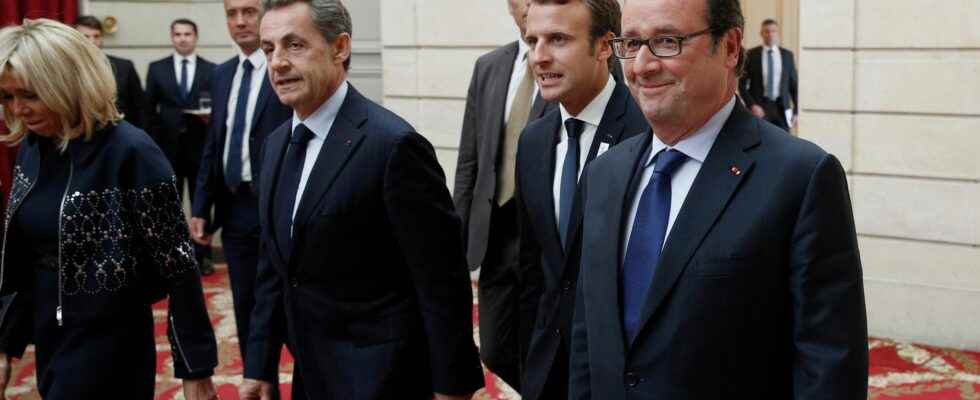François Hollande confided it afterwards, it is always with “a touch of emotion” that a former president returns to the Elysée. We often repeat the story of Valéry Giscard d’Estaing who, after his defeat on May 10, 1981, was reluctant to return to the scene of the crime. Legends have an advantage, they are often false: on two occasions, VGE agreed to meet François Mitterrand one-on-one.
It is exceptional that François Hollande shares the table with Emmanuel Macron, Head of State – on Friday February 3, it was the second time since 2017. Tu quoque mi fili : Brutus and Caesar didn’t have a bite to eat together every four mornings. François Hollande could not help recalling, three days later on BFMTV, that his former collaborator, his ex-minister had announced in the fall of 2016 his “decision to be a candidate when I had nothing said”. “A distance has necessarily been established”: in other words, the socialist can no longer see his successor in painting. At least, in the salon des portraits, which Emmanuel Macron had restored in 2019, can he look away at a pope (Pius IX), an emperor (Francis-Joseph of Austria), a tsar (Nicolas I) or a string of kings and queens (Victor-Emmanuel of Italy, Victoria of the United Kingdom, Frederick-William IV of Prussia, Isabella II of Spain or William I of Württemberg). What better way to evoke this republican monarchy that is, or was for a long time, the France of the Fifth?
Nicolas Sarkozy’s advantage is that he did not lose a presidential election. Well, not really, not completely… “I started at 31%, I finished at 48.5%, people say to themselves, ‘Hey, that could have passed'”, he likes to remark about the 2012 election. Tuesday, February 7, the Republican Guard is still out. Nicolas Sarkozy arrives, file in hand; he no longer counts the number of exchanges he had with Emmanuel Macron. On the shots of the photographer Soazig de la Moissonnière, the difference is striking: Emmanuel Macron and Nicolas Sarkozy laugh each time, when the atmosphere seems more austere with François Hollande. There is one thing that this president knows how to do wonderfully: manage emotional Sarkozy. This does not prevent him then from doing as he pleases.
Institutional work
The official purpose of these summit meetings is the imminent launch of the institutional project. At the end of January, the president told a visitor that he now had “clear ideas”. “If I can’t do something big, I won’t do it,” also warned Emmanuel Macron, who hasn’t forgotten that Nicolas Sarkozy had only passed his constitutional revision with one vote in advance. while the right was in the majority in the National Assembly as in the Senate – which is not quite the case (it takes a valid vote from both chambers and then a three-fifths majority to succeed).
“I have never given myself so much trouble in my life as to succeed in this constitutional revision”: Nicolas Sarkozy is the last president to have reformed the Fundamental Law. His “Jauressian” side, according to his expression: “To say that we should not touch the Constitution is absurd. It is by going towards the sea that the river remains faithful to its source.” The priority questions of constitutionality, the famous QPC, it is him. “The President of the Constitutional Council is my most dynamic ambassador, he does not remember that he voted against”, he laughs, pinning Laurent Fabius. The possibility for the Head of State to address the parliamentarians at Versailles is also his. “François Hollande had been definitive about addressing the congress for a president, he did it and I saw him do it, he was happy,” he jokes.
The ban on serving more than two consecutive terms is always him. Nicolas Sarkozy often cites as an example the case of Margaret Thatcher, who became incapable of anticipating the revolt of her party: “After ten years, we no longer hear.” This last point, Emmanuel Macron has never digested it. From 2018, a year after his accession to the Elysée, he let go in front of visitors: “The only elected official on whom this is imposed is my apple.” The apple always has it in the throat.
Nicolas Sarkozy takes his interest in institutions to the point of wanting to choose the Prime Minister himself. Not between 2007 and 2012, as article 8 of the Constitution then gave him the entire prerogative, no, in 2022. In the spring of last year, a lunch between the former president and an oil from Macronie, Richard Ferrand, turns vinegar. The Breton had found the ex a little too insistent.
Since he is no longer at the Elysée, François Hollande has clear ideas on the subject, he even wrote a book in 2019, Responding to the democratic crisis, which he then sent to Emmanuel Macron. A president elected for six years, deputies for four years, the abolition of the post of Prime Minister, a great evening which is not for tomorrow. He sees no objection to the limitation of presidential terms, he speaks knowingly: “It’s already not easy to be re-elected, to be re-elected twice, it would give ideas but bad ideas!” But he doubts Emmanuel Macron’s room for maneuver to move forward: “If a reform has not been carried out during the presidential campaign and in some way ratified by the victory of the candidate, it is very difficult.”
The institutional issue has become a democratic issue. The last three Heads of State are better placed than anyone to know, politics no longer prints, the presidential figure looks bad and behind her, the whole system seems seized up. On Tuesday, Emmanuel Macron will receive, following the protocol order, the presidents of the Senate and then of the National Assembly, Gérard Larcher and Yaël Braun-Pivet. “The president is not saying anything, which means that something is brewing,” an adviser greedily advances. But the proof that there is a path to succeed in this project has not yet been provided.
